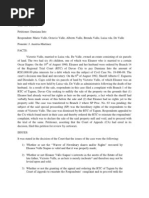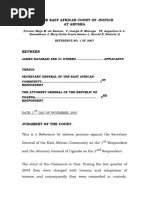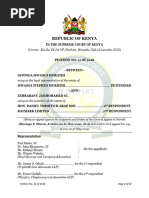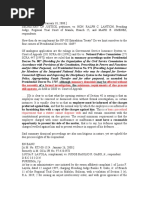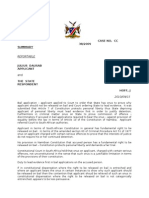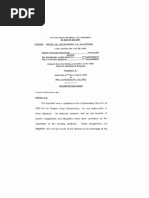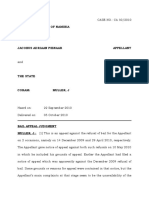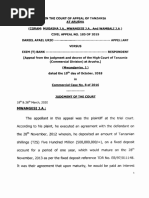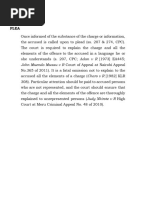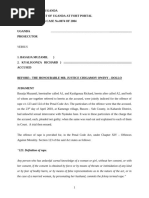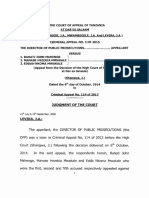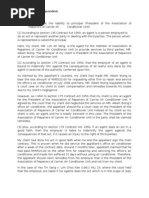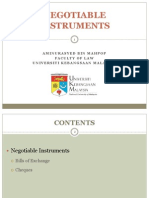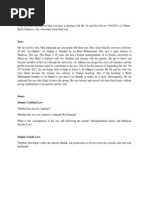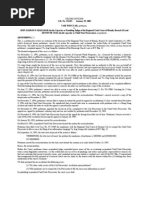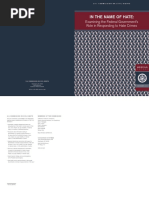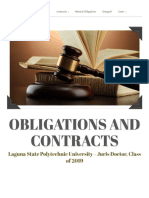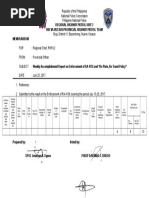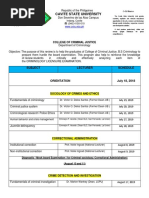Oh Keng Seng FC
Oh Keng Seng FC
Uploaded by
lionheart8888Copyright:
Available Formats
Oh Keng Seng FC
Oh Keng Seng FC
Uploaded by
lionheart8888Original Description:
Copyright
Available Formats
Share this document
Did you find this document useful?
Is this content inappropriate?
Copyright:
Available Formats
Oh Keng Seng FC
Oh Keng Seng FC
Uploaded by
lionheart8888Copyright:
Available Formats
Page 1
Page 2 2 MLJ 244, *; [1980] 2 MLJ 244 1 of 8 DOCUMENTS 2003 LexisNexis Asia (a division of Reed Elsevier (S) Pte Ltd) The Malayan Law Journal OH KENG SENG V PUBLIC PROSECUTOR [1980] 2 MLJ 244 FEDERAL COURT CRIMINAL APPEAL NO 39 OF 1978 FC KUALA LUMPUR DECIDED-DATE-1: 3 MARCH 1980, 14 JULY 1980 SUFFIAN LP, RAJA AZLAN SHAH CJ (MALAYA) & WAN SULEIMAN FJ CATCHWORDS: Criminal Law and Procedure - Charge of sedition - Charge - Speech alleged to be seditious should be set out in charge - Amendment of charge - Sedition Act, 1948 (Revised 1969), ss. 3(1) and 4(1)(b) HEADNOTES: This was an appeal from the decision of the High Court reported in [1979] 2 MLJ 174. On the appeal the question was raised whether the charge was proper. Held: (1) in a charge of sedition it is not necessary to set out the particular words of the law defining sedition in the charge. What the law requires is that the speech or those parts of the speech alleged to be seditious should be set out in the charge and then it is for the court to decide having considered all the evidence whether those words mentioned are seditious; (2) in this case the appellant knew full well what had been alleged against him, as his defence indicated; (3) although the amendment to the charge was superfluous, the trial judge had power to amend the charge and the statutory requirements were complied with, so that the appellant was in no way prejudiced. Cases referred to Yoh Meng Heng v Public Prosecutor [1970] 1 MLJ 14 Public Prosecutor v Oh Keng Seng [1977] 2 MLJ 206, 210
FEDERAL COURT Yeap Ghim Guan for the appellant.
Page 3 2 MLJ 244, *; [1980] 2 MLJ 244 Mohamed Noor bin Haji Abdullah (Deputy Public Prosecutor) for the respondent. ACTION: FEDERAL COURT LAWYERS: Yeap Ghim Guan for the appellant. Mohamed Noor bin Haji Abdullah (Deputy Public Prosecutor) for the respondent. JUDGMENTBY: WAN SULEIMAN FJ (delivering the judgment of the Court): We dismissed this appeal and affirmed the conviction and sentence imposed by the learned trial judge. However an important point of law was raised during the hearing which requires a ruling by this court. This appeal has a rather chequered history. Since the original charge preferred against appellant was the [*245] object of considerable misgivings on the part of the learned trial judge we should perhaps set it down in full. Appellant was charged before the judge in the High Court, Seremban as follows: -"That you on the 23rd day of June, 1972 between 8.40 p.m. and 9.35 p.m. at the Padang Besar, Tampin, in the District of Tampin, in the State of Negri Sembilan, uttered seditious words in Mandarin (the full translation of the text of which is attached as Schedule 'A' to this charge) and that you have thereby committed an offence under section 4(1)(b) of the Sedition Act 1948 (Revised 1969) and punishable under section 4(1) of the said Act." At the close of the prosecution case on September 7, 1976, he was acquitted and discharged, the learned judge being of the view that the speech was not seditious. On appeal by the Public prosecutor this court set aside the order of acquitted and directed that the appellant be called upon to make his defence. In his defence, to cite the very words of the trial judge, "the accused did not seriously deny that he had made the speech which was the subject-matter of the charge. He said that his speech was fair criticism of Government policies, that he had no intention of causing racial trouble and that he never advocated to the people that they should take the law into their own hands." In short he relied on the defence provided by section 3(2) of the Sedition Act. At the close of the defence case, Mr. Yeap, counsel submitted that the charge against the appellant was improper and defective because it did not contain particulars alleging under what category of seditious tendency the accused had contravened the Sedition Act, 1948. He cited the case of Yoh Meng Heng v Public Prosecutor [1970] 1 MLJ 14 in support. In that case, which was an appeal from the judgment of the Sessions Court, the second charge (the one alleged to be defective) read: -"That you on April 18, 1960 at about 6.30 a.m. at an unnumbered hut at Bertam Estate, Kepala Batas, in the District of Butterworth, in the State of Penang, were found, without lawful excuse, to have in your possession a subversive document, to wit a document titled 'Is Malaya a Democratic Country? Is there Freedom of Assembly, Association, Speech, Publication, Strike, Demonstration etc.' and that you have thereby committed an offence punishable under section 29(1) of the Internal Security Act No. 12 of 1960." The appellant in that appeal was apprehended, while he was with a group of persons painting some writings on the roadside. On the next day, an inspector took him to his house where in a room, which his mother, a prosecution witness, admitted, was occupied by him, the publication entitled "Quotations from
Page 4 2 MLJ 244, *; [1980] 2 MLJ 244 Chairman Mao" specified in the first charge and the alleged subversive documents were found. Translations were made of the pamphlets (P2A) and produced in court. This was the only evidence adduced by the prosecution. It was not stated in the charge just how the pamphlets were classified as coming within the definition of "subversive document" as defined in section 29 of the I.S.A. Ong J. (as he then was) went on to set out the definition of subversive document in section 29(3) of the I.S.A.: it being defined as any document having in part or in whole a tendency -(a) to excite organised violence against person or property in the Federation; or (b) to support, propagate or advocate any act prejudicial to the security of the Federation or the maintenance or restoration of public order therein or inciting to violence therein or counselling disobedience to the law thereof or to any lawful order therein; or (c) to invite, request or demand support for or on account of any collection, subscription, contribution or donation, whether in money or in kind, for the direct or indirect benefit or use of persons who intend to act or are about to act, or have acted, in a manner prejudicial to the security of the Federation or to the maintenance of public order therein, or who incite to violence therein or counsel disobedience to the law thereof or any lawful order therein. The learned judge then referred to Ratanlal's Law of Crimes which, he remarked, shows that specimen charges relating to sedition set out particulars by reference to the particular words of the law defining what is a seditious tendency. He added that the charge in that appeal was embarrassing to the appellant in not having specified in which manner they (the documents) were alleged to be subversive and therefore the appellant was prejudiced in his defence. He therefore set aside the order of conviction and ordered a retrial. We should point out that the Sessions Court President in reading the offending document came to a finding that the pamphlets were subversive "in that they have the tendency to excite organised violence and counselling disobedience to law" and therefore coming within the ambit of section 29(3)(a) & (b) of the I.S.A., 1960 but the learned appellate judge was unable to find evidence of such tendency in that document. Perhaps this view of the document had some considerable effect in persuading Ong J. to take the course which he did. In the present appeal following the decision in Yoh's case the learned judge remarked that the charges against the appellant are on somewhat similar lines as section 29 of the I.S.A., 1960. In charging the appellant with uttering seditious words, he said, the charge did not specify the particular category of seditious tendency as defined in section 3(1) which is violated by those words. He then held that the appellant had been prejudiced and embarrassed in making his defence for he was not in a position to know exactly what he was required to rebut in defence. In consequence he ruled that the charge was defective for want of essential and material particulars, and therefore the charge as framed could not be sustained. It is not strictly speaking correct that this point regarding the charge was only raised for the first time at the close of the defence case but Yoh's case was indeed first cited on this occasion. However the reasoning behind what the learned trial judge then remarked seem to us, with great respect, to indicate a remarkable confusion of thought, for his Lordship said, "Now if I had been exercising an appellate jurisdiction [*246] I would have no hesitation in dismissing the charge forthwith or at least in ordering a retrial. However, sitting in the first instance I have to view this case in a different light." As we have alluded to before this point had been raised in a somewhat different form by learned defence counsel at the commencement of the prosecution case (See Public Prosecutor v Oh Keng Seng [1977] 2 MLJ 206, 210) and we quote: -"Counsel for the defence objected to the whole speech being included in the charge on the ground that the defence would not be in a position to know whether the whole speech was alleged to be seditious or only part
Page 5 2 MLJ 244, *; [1980] 2 MLJ 244 of it. He said that it was important for the defence to know exactly which parts of the speech were alleged to be seditious and therefore only those parts should be incorporated in the charge. The learned trial judge overruled this objection, as he thought there was nothing improper in annexing the whole speech to the charge, for he said (this point was conceded by both counsel before us) the speech had to be considered as a whole in order to decide whether it was seditious or not. However, at the end of the prosecution case the learned judge directed the Deputy Public Prosecutor to underline (and the Deputy Public Prosecutor complied) the particular passages which the prosecution said were seditious." From this passage it is abundantly clear that the learned judge was then satisfied with the propriety of the charge. Let us now examine the specimen charge in Ratanlal's Law of Crimes (21st Edition at p. 322) which had apparently persuaded Ong J. to hold that the charge in Yoh's case was defective for want of sufficient particulars of a certain sort. The specimen charge reads: -"That you, on or about the day of at by writing (or spreading) the words ( mention them) brought (or attempted to bring) into hatred or contempt (or executed or attempted to execute disaffection towards) the Government established by law in India, and thereby committed an offence under section 124A... ." (We have omitted portions irrelevant for our purpose). We note that though the objection raised by counsel regarding the charge led to the offending passage of appellant's speech (the full translation referred to as Schedule "A" had formed part of the original charge) being underlined by the learned deputy at the instance of the trial judge, the former had narrowed these down to two passages in the first appeal before us. With respect, we think that Ong J. erred in Yoh's case in requiring the particular words of the law defining what is a seditious tendency to be set out in the charge, and it follows that we hold that the learned trial judge in this case was equally in error in requiring the same particulars to be set out in the instant appeal. The offending passages of the speech, in our considered opinion, (and Ratanlal's specimen charge required only the words to be mentioned), had been sufficiently indicated, the appellant was in no way embarrassed or prejudiced in his defence. What the law requires is that the speech or those parts of the speech alleged to be seditious should be set out in the charge, and then it is for the court to decide having considered all the evidence, whether those words mentioned are seditious. We should add that the appellant knew full well all the time what had been alleged against him, as his defence indicates. Since the amendment to the charge, though superfluous, was something within the power of the trial court under section 158 of the Criminal Procedure Code and the requirements of section 159 had also been complied with, the appellant was in no way prejudiced. Accordingly we dismissed the appeal and affirmed the conviction and sentence imposed. Appeal dismissed. SOLICITORS: Solicitors: Yeap & Co. LOAD-DATE: June 3, 2003
You might also like
- Vrrenewal PDFDocument1 pageVrrenewal PDFEvan TothNo ratings yet
- Bonus Chapter 20B - The Making of Manhunt: Unabomber, and The "Unmaking" of A Few Retired FBI AgentsDocument17 pagesBonus Chapter 20B - The Making of Manhunt: Unabomber, and The "Unmaking" of A Few Retired FBI AgentsSTBWNo ratings yet
- State V Treebhoowon Avinash & Moonea SandipDocument10 pagesState V Treebhoowon Avinash & Moonea SandipHemant HurlollNo ratings yet
- Illian V PP PDFDocument5 pagesIllian V PP PDFAngel SiahNo ratings yet
- Fan Yew Teng FCDocument10 pagesFan Yew Teng FClionheart8888No ratings yet
- Constructive TrustDocument24 pagesConstructive Trustlionheart8888100% (3)
- Fan Yew Teng FCDocument10 pagesFan Yew Teng FClionheart8888No ratings yet
- Into vs. ValleDocument2 pagesInto vs. VallefangshNo ratings yet
- 2014 ZMHC 112Document31 pages2014 ZMHC 112chitundu kasondeNo ratings yet
- Ruling Pius Patrick and Ors Vs The StateDocument9 pagesRuling Pius Patrick and Ors Vs The StateABDOULIENo ratings yet
- In The East African Court of Justice at Arusha: James Katabazi and 21 Others ApplicantsDocument26 pagesIn The East African Court of Justice at Arusha: James Katabazi and 21 Others ApplicantsMakumbi FrancisNo ratings yet
- 2020 TZHC 4469Document7 pages2020 TZHC 4469MuddyNo ratings yet
- Baigana V Uganda (Criminal Appeal No 8 of 2010) 2016 UGCA 1 (25 May 2016)Document10 pagesBaigana V Uganda (Criminal Appeal No 8 of 2010) 2016 UGCA 1 (25 May 2016)HIGENYI TIMOTHYNo ratings yet
- SC. Pet. No. 41 of 2018 Gitonga Mwangi Muriithi Vs Zehrabanu Janmohamed Estate of Hon. Daniel Toroitich Arap MoiDocument57 pagesSC. Pet. No. 41 of 2018 Gitonga Mwangi Muriithi Vs Zehrabanu Janmohamed Estate of Hon. Daniel Toroitich Arap MoinicklykipkorirNo ratings yet
- Asia Rashid Mohamed Vs Mgeni Seif (Civil Appeal 128 of 2011) 2012 TZCA 142 (23 May 2012)Document14 pagesAsia Rashid Mohamed Vs Mgeni Seif (Civil Appeal 128 of 2011) 2012 TZCA 142 (23 May 2012)Henry MtengaNo ratings yet
- Case - (1988) 1 LNS1 139Document4 pagesCase - (1988) 1 LNS1 139Premela RajendranNo ratings yet
- Judgment of The Court: 14th & 20th February, 2020Document9 pagesJudgment of The Court: 14th & 20th February, 2020Gervas GeneyaNo ratings yet
- CRIMINAL APPLICATION NO. 5 OF 2013 (RULING) FinalDocument14 pagesCRIMINAL APPLICATION NO. 5 OF 2013 (RULING) FinalMuddyNo ratings yet
- Sunil Kumar PalDocument16 pagesSunil Kumar PalManikantan S KandathilNo ratings yet
- Criminal Appeal 200 of 2012Document7 pagesCriminal Appeal 200 of 2012cleyNo ratings yet
- CASE NO.: CA105/2009 in The High Court of Namibia Held at OshakatiDocument11 pagesCASE NO.: CA105/2009 in The High Court of Namibia Held at OshakatiAndré Le RouxNo ratings yet
- 20BBL128 Ethics Case AnalysisDocument17 pages20BBL128 Ethics Case AnalysisPawni NagawatNo ratings yet
- Mabula Makoye Another Vs Republic (Criminal Appeal 227 of 2017) 2020 TZCA 1762 (28 August 2020)Document22 pagesMabula Makoye Another Vs Republic (Criminal Appeal 227 of 2017) 2020 TZCA 1762 (28 August 2020)edmund.ntayandiNo ratings yet
- MD, Mendez - Own Plea of Guilty, No Appeal Lies, PASKALI KAMARADocument14 pagesMD, Mendez - Own Plea of Guilty, No Appeal Lies, PASKALI KAMARAIsaya J ElishaNo ratings yet
- G.R. No. 117472 Echegaray Case-1997Document42 pagesG.R. No. 117472 Echegaray Case-1997iris galecioNo ratings yet
- Case LawDocument7 pagesCase LawAkampulira Kennedy KNo ratings yet
- Administrative Cases - PoliceDocument52 pagesAdministrative Cases - Policehudor tunnelNo ratings yet
- Case No. CC: ReportableDocument12 pagesCase No. CC: ReportableAndré Le RouxNo ratings yet
- Musa Yusuph Kipengele Vs R (Criminal Appeal 13 of 2022) 2022 TZHC 13465 (3 October 2022)Document10 pagesMusa Yusuph Kipengele Vs R (Criminal Appeal 13 of 2022) 2022 TZHC 13465 (3 October 2022)syxr6625krNo ratings yet
- (Kngajhi I) : M R O S O. 3.A.Document21 pages(Kngajhi I) : M R O S O. 3.A.Alkado KadoNo ratings yet
- The Law of Pre-Trial 2Document33 pagesThe Law of Pre-Trial 2nhsxzsmkm8No ratings yet
- James Duru Nade Vs Republic (Criminal Appeal No 100 of 2020) 2023 TZCA 17642 (22 September 2023)Document9 pagesJames Duru Nade Vs Republic (Criminal Appeal No 100 of 2020) 2023 TZCA 17642 (22 September 2023)rankingNo ratings yet
- Failure To Consider Submissions Are Not Evidence, ReDocument24 pagesFailure To Consider Submissions Are Not Evidence, ReMatojo CosattaNo ratings yet
- The Republic of UgandaDocument7 pagesThe Republic of UgandaTURINAWE JIMMYNo ratings yet
- Digested Cases Rule 110 Sec 6Document10 pagesDigested Cases Rule 110 Sec 6RonnieEnggingNo ratings yet
- Civil Application 244 of 2010Document6 pagesCivil Application 244 of 2010Rickcard BettNo ratings yet
- Ag V Mafojane-Read VersionDocument5 pagesAg V Mafojane-Read VersionloratoseithamoNo ratings yet
- Free Access To Ugandan Law: JudgmentsDocument12 pagesFree Access To Ugandan Law: JudgmentsscoviatugonzaNo ratings yet
- FRANKLIN M. DRILON, AURELIO C. TRAMPE, FERDINAND R. ABESAMIS and EULOGIO MANANQUIL vs. COURT OF APPEALS, HON. ERIBERTO U. ROSARIO, JR. AND JUAN PONCE ENRILE G.R. No. 106922, April 20, 2001Document2 pagesFRANKLIN M. DRILON, AURELIO C. TRAMPE, FERDINAND R. ABESAMIS and EULOGIO MANANQUIL vs. COURT OF APPEALS, HON. ERIBERTO U. ROSARIO, JR. AND JUAN PONCE ENRILE G.R. No. 106922, April 20, 2001Louie LorenzanaNo ratings yet
- State Versus SheehamaDocument3 pagesState Versus SheehamaAndré Le RouxNo ratings yet
- Fredrick J Zaabwe V Orient Bank and 5 OrsDocument53 pagesFredrick J Zaabwe V Orient Bank and 5 Ors_olukaNo ratings yet
- Mahuti Chacha Marwa Vs Republic (Criminal Appeal No 500 of 2020) 2024 TZCA 562 (15 July 2024)Document17 pagesMahuti Chacha Marwa Vs Republic (Criminal Appeal No 500 of 2020) 2024 TZCA 562 (15 July 2024)clarenceNo ratings yet
- Adriaan Jacobus Pienaar V The State - Judgment.ca 30-2010.muller J. 05 Oct 2010Document32 pagesAdriaan Jacobus Pienaar V The State - Judgment.ca 30-2010.muller J. 05 Oct 2010André Le RouxNo ratings yet
- Civ. App. No. 185 of 2019, Daniel Apael Urio vs. Exim (T) Bank NewDocument23 pagesCiv. App. No. 185 of 2019, Daniel Apael Urio vs. Exim (T) Bank Newi.pmanaseNo ratings yet
- Robert Levine - Vs - Deborah Clement-Holyoke Police-St Paricks Day Parade-First AmendmentDocument11 pagesRobert Levine - Vs - Deborah Clement-Holyoke Police-St Paricks Day Parade-First AmendmentConnaissableNo ratings yet
- Week 4-PleaDocument17 pagesWeek 4-PleafaithraruNo ratings yet
- THIRD PAPER 2019 CRIMINAL LAWDocument16 pagesTHIRD PAPER 2019 CRIMINAL LAWJohnNo ratings yet
- Uganda V Basaija Anor (Criminal Session Case No 0074 of 2004) 2008 UGHCCRD 13 (15 October 2008)Document21 pagesUganda V Basaija Anor (Criminal Session Case No 0074 of 2004) 2008 UGHCCRD 13 (15 October 2008)kingsmk.ksNo ratings yet
- Judgment of The Court: 6th May & 28th June 2024Document13 pagesJudgment of The Court: 6th May & 28th June 2024KELVIN A JOHNNo ratings yet
- Criminal Procedure ActDocument10 pagesCriminal Procedure ActHussein MsangiNo ratings yet
- The State V Abisai Ndaumbwa. CC 11 - 2010.judgm Twt.02 Feb. Tommasi, JDocument3 pagesThe State V Abisai Ndaumbwa. CC 11 - 2010.judgm Twt.02 Feb. Tommasi, JAndré Le RouxNo ratings yet
- Shimbi Daud Kulwa Others Vs Republic Criminal Appeal No 660 of 2020Document39 pagesShimbi Daud Kulwa Others Vs Republic Criminal Appeal No 660 of 2020clarenceNo ratings yet
- Voon Lee Shan-Quantum of DamagesDocument15 pagesVoon Lee Shan-Quantum of DamagesAminah JahanNo ratings yet
- Nagawa V SegawaDocument9 pagesNagawa V SegawaMelvinNo ratings yet
- ReportableDocument29 pagesReportablelakshya agarwalNo ratings yet
- DPP V Bahati John Mahenge (CAT)Document41 pagesDPP V Bahati John Mahenge (CAT)RANDAN SADIQNo ratings yet
- Charles Harry Vs AGDocument9 pagesCharles Harry Vs AGKellyNo ratings yet
- Firmon Mlowe Vs Republic (Criminal Appeal 504 of 2020) 2022 TZCA 694 (9 November 2022)Document15 pagesFirmon Mlowe Vs Republic (Criminal Appeal 504 of 2020) 2022 TZCA 694 (9 November 2022)Victor BernardNo ratings yet
- Introduction of Plea in KenyaDocument3 pagesIntroduction of Plea in KenyaWangui0% (2)
- Coram: Katureebe C.J., Tumwesigye Arach-Amoko Mwangusya Mwondha JJ.S.C.Document17 pagesCoram: Katureebe C.J., Tumwesigye Arach-Amoko Mwangusya Mwondha JJ.S.C.Musiime Katumbire HillaryNo ratings yet
- In The Court of The Civil Judge No:2, Kamrup, Guwahati: Present: Sri R.Bhattacharjee, A.J.S.Document17 pagesIn The Court of The Civil Judge No:2, Kamrup, Guwahati: Present: Sri R.Bhattacharjee, A.J.S.Zenith ChhablaniNo ratings yet
- Omary Nzobalakila Vs Republic (Criminal Appeal 56 of 2022) 2022 TZHC 14678 (29 September 2022)Document7 pagesOmary Nzobalakila Vs Republic (Criminal Appeal 56 of 2022) 2022 TZHC 14678 (29 September 2022)innocentmkuchajrNo ratings yet
- Direct HarmDocument37 pagesDirect Harmlionheart8888No ratings yet
- Faridah BegumDocument22 pagesFaridah Begumlionheart8888100% (2)
- 2 MLJ 348, (1989) 2 MLJ 348Document7 pages2 MLJ 348, (1989) 2 MLJ 348lionheart8888No ratings yet
- CLJ 2006 4 129Document66 pagesCLJ 2006 4 129lionheart8888No ratings yet
- MeetingDocument29 pagesMeetinglionheart8888No ratings yet
- 2nd Speaker For RespondentbDocument2 pages2nd Speaker For Respondentblionheart8888No ratings yet
- Mi & M Corporation & Anor V A Mohamed IbrahiDocument7 pagesMi & M Corporation & Anor V A Mohamed Ibrahilionheart8888No ratings yet
- Swee Lan V DR Johan: Tutorial Tort (Tutorial 1 Question 2)Document4 pagesSwee Lan V DR Johan: Tutorial Tort (Tutorial 1 Question 2)lionheart8888No ratings yet
- The Race To The Bottom Hypothesis: An Empirical and Theoretical ReviewDocument20 pagesThe Race To The Bottom Hypothesis: An Empirical and Theoretical ReviewBenjamin Goo KWNo ratings yet
- Islamic Juris Child CustodyDocument6 pagesIslamic Juris Child Custodylionheart8888No ratings yet
- Topik 5 Instrumen Boleh NiagaDocument36 pagesTopik 5 Instrumen Boleh Niagalionheart8888No ratings yet
- International Humanitarian Law and Use of ForceDocument27 pagesInternational Humanitarian Law and Use of Forcelionheart8888No ratings yet
- Topik 7 Sekuriti Sebagai KolateralDocument54 pagesTopik 7 Sekuriti Sebagai Kolaterallionheart8888No ratings yet
- Juris StoryDocument1 pageJuris Storylionheart8888No ratings yet
- Topik 2 Bank SBG PerantaraDocument4 pagesTopik 2 Bank SBG Perantaralionheart8888No ratings yet
- 2 MLJ 330, (1987) 2 MLJ 330Document6 pages2 MLJ 330, (1987) 2 MLJ 330lionheart8888No ratings yet
- Perman SDN BHD & Ors V European CommoditiesDocument14 pagesPerman SDN BHD & Ors V European Commoditieslionheart88880% (1)
- Section 340 - Tan Ying Hong - Civil AppealDocument29 pagesSection 340 - Tan Ying Hong - Civil Appeallionheart8888No ratings yet
- Quah Poh Hoe Peter V Probo Pacific Leasing PDocument11 pagesQuah Poh Hoe Peter V Probo Pacific Leasing Plionheart8888No ratings yet
- Short-Term Imprisonment in Malaysia An OverDocument13 pagesShort-Term Imprisonment in Malaysia An Overlionheart8888No ratings yet
- 2 MLJ 599, (1998) 2 MLJ 599Document11 pages2 MLJ 599, (1998) 2 MLJ 599lionheart8888No ratings yet
- 4 MLJ 617, (2006) 4 MLJ 617Document18 pages4 MLJ 617, (2006) 4 MLJ 617lionheart88880% (1)
- Wrigglesworth v. Wilson AnthonyDocument5 pagesWrigglesworth v. Wilson Anthonylionheart8888No ratings yet
- 1 MLJ 245, (1969) 1 MLJ 245Document7 pages1 MLJ 245, (1969) 1 MLJ 245lionheart8888No ratings yet
- (1903) 1 KB 81Document6 pages(1903) 1 KB 81lionheart8888No ratings yet
- 8 Currents Int'l Trade L.J. 31Document30 pages8 Currents Int'l Trade L.J. 31lionheart8888No ratings yet
- Evidence Case Digest List - 1Document4 pagesEvidence Case Digest List - 1James DecolongonNo ratings yet
- Crim 1 DigestsDocument36 pagesCrim 1 DigestsAnne SecretboxNo ratings yet
- The Philippines: Enbanc G.R. No. 224946 - Christian P Antonial Acharon V. People ofDocument19 pagesThe Philippines: Enbanc G.R. No. 224946 - Christian P Antonial Acharon V. People ofRod bembenutoNo ratings yet
- The Doctor and Sa Law 2024Document60 pagesThe Doctor and Sa Law 2024Mpho MosehlaNo ratings yet
- Nаtionаl Lаw Institutе Univеrsity, BhopаlDocument17 pagesNаtionаl Lаw Institutе Univеrsity, BhopаlDurgesh yadavNo ratings yet
- Conflict Diagnosis PaperDocument5 pagesConflict Diagnosis PaperJulie Perman-Hoffman0% (1)
- Module 1Document13 pagesModule 1aspaeducmailNo ratings yet
- Law 104 Syllabus RJC 29 June 2010Document10 pagesLaw 104 Syllabus RJC 29 June 2010Tina Reyes-BattadNo ratings yet
- Analysis of Nick Joaquin's 'A Heritage of Smallness'Document3 pagesAnalysis of Nick Joaquin's 'A Heritage of Smallness'RoseballToledo0% (4)
- Tam Wing Tak v. Hon. Ramon MakasiarDocument3 pagesTam Wing Tak v. Hon. Ramon MakasiarbearzhugNo ratings yet
- Jack G. Adargo v. Wayne K. Patterson, Warden Colorado State Penitentiary, 371 F.2d 822, 10th Cir. (1967)Document4 pagesJack G. Adargo v. Wayne K. Patterson, Warden Colorado State Penitentiary, 371 F.2d 822, 10th Cir. (1967)Scribd Government DocsNo ratings yet
- People V VilbarDocument2 pagesPeople V VilbarJustineNo ratings yet
- 11 13 in The Name of Hate PDFDocument310 pages11 13 in The Name of Hate PDFChris vegasNo ratings yet
- Rule 118: Pre - Trial: Criminal Procedure Notes (2013 - 2014) Atty. Tranquil SalvadorDocument3 pagesRule 118: Pre - Trial: Criminal Procedure Notes (2013 - 2014) Atty. Tranquil SalvadorRache GutierrezNo ratings yet
- CITIZENSHIP TRAINING ReviewerDocument7 pagesCITIZENSHIP TRAINING ReviewerB - DAPO, John Michael Q.No ratings yet
- Us V SalaveriaDocument6 pagesUs V SalaveriaIs Mai RaNo ratings yet
- Chapter 2 Essential Requisites of Contracts - Obligations and ContractsDocument78 pagesChapter 2 Essential Requisites of Contracts - Obligations and ContractsALFREDO PUTAN JRNo ratings yet
- State of Arizona v. Shawnte Shuree Jones, Ariz. (2014)Document5 pagesState of Arizona v. Shawnte Shuree Jones, Ariz. (2014)Scribd Government DocsNo ratings yet
- Weekly Accomplishment Report On Enforcement of RA 4136 and "No Plate, No Travel Policy"Document1 pageWeekly Accomplishment Report On Enforcement of RA 4136 and "No Plate, No Travel Policy"nestorlatapNo ratings yet
- CCJ Review Schedule 2019Document3 pagesCCJ Review Schedule 2019Mark ErvinNo ratings yet
- Marcelino Vs Cruz Case DigestDocument2 pagesMarcelino Vs Cruz Case Digestkikhay11No ratings yet
- United States Court of Appeals, Tenth CircuitDocument3 pagesUnited States Court of Appeals, Tenth CircuitScribd Government DocsNo ratings yet
- People Vs Ylagan Rule 117Document2 pagesPeople Vs Ylagan Rule 117Czara Dy100% (1)
- 482 Aniruddh TatedDocument9 pages482 Aniruddh TatedKapil DuggalNo ratings yet
- Kyllo Vs United StatesDocument2 pagesKyllo Vs United Statesgianfranco0613No ratings yet
- Complaint Affidavit TabilaDocument3 pagesComplaint Affidavit TabilaRoger Montero Jr.No ratings yet
- State ResponsibilityDocument14 pagesState ResponsibilityVaibhav SinghNo ratings yet







